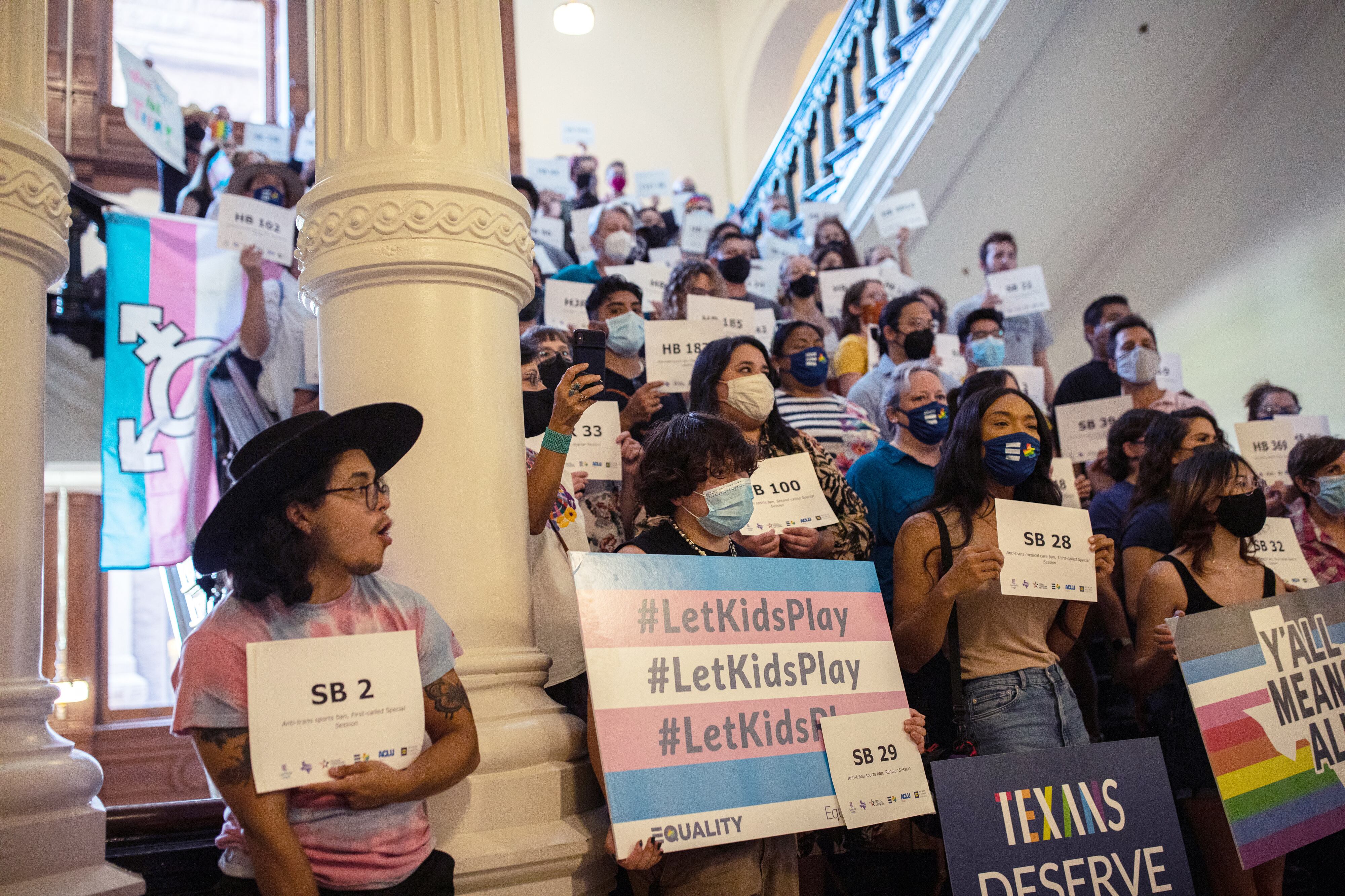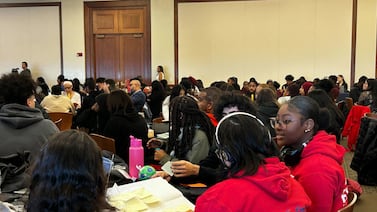The Biden administration on Thursday proposed a rule that would allow schools to place some restrictions on transgender athletes, particularly in competitive high school and college sports.
In a long-awaited proposal, federal education officials said that K-12 schools and colleges cannot establish across-the-board bans on transgender students participating on sports teams that correspond with their gender identity — a direct challenge to laws in several states. But the proposal would allow schools to keep transgender students off certain teams in the interest of “ensuring fairness in competition or preventing sports-related injury,” according to an education department fact sheet.
That language echoes complaints by critics, including Republican lawmakers, who say that allowing transgender girls to compete in girls sports gives them an unfair advantage and poses potential safety risks.
Under the proposed rule, schools would violate federal civil rights law if they enact “categorical bans” on transgender athletes “just because of who they are,” the fact sheet said.
“Every student should be able to have the full experience of attending school in America, including participating in athletics, free from discrimination,” U.S. Secretary of Education Miguel Cardona said in a statement.
The proposed rule would codify the administration’s position that transgender students are protected by federal anti-discrimination laws. Still, the proposal is likely to face criticism that it still allows schools to exclude trans athletes, and is sure to be challenged in court by Republican-led states that have passed laws barring transgender girls from joining girls sports teams.
If a school chooses to restrict participation based on sex, education department officials said, it would have to consider the individual sport, the age of the students participating, and how competitive the team is.
Officials said they expected most elementary school students would be able to participate on a sports team corresponding with their gender identity and that it would be particularly difficult for schools to exclude them. But schools would be permitted to adopt policies that limit the participation of transgender students in high school and college, especially in more competitive sports.
“It seems like there would be some clarity on the elementary school level, like let’s not ban third graders from playing on a soccer team,” said Suzanne Eckes, a professor of education law at the University of Wisconsin-Madison, who has followed lawsuits over trans student athletes. “At the high school level, we’ll have to see how that plays out.”
Less than 2% of high school students identify as transgender, according to a 2017 CDC survey of 10 states and several large districts, and only a fraction of those students participate in school sports.
Many states have passed laws restricting transgender athletes
Still, at least 20 states have passed laws that ban transgender athletes from playing on sports teams that match their gender identity, according to the Movement Advancement Project, a nonprofit that tracks policies affecting LGBTQ people.
On Wednesday, Kansas became the latest state to enact such a ban, passing a law that bars transgender girls from playing on girls sports teams. The law targets a minuscule number of students: Out of 106,000 student athletes in the Kansas State High School Activities Association, only three are transgender girls, a spokesperson told KCUR.
A number of states that restrict transgender athletes have already sued the Biden administration, arguing that guidance saying federal anti-discrimination laws protect transgender people infringes on states’ rights.
Last June, federal education officials put forward another rule stating that LGBTQ students are protected from discrimination based on sexual orientation and gender identity under Title IX, the federal civil rights law that prohibits sex discrimination at school. (That rule is not yet final, but education department officials expect it will be in May.)
At the time, the Biden administration announced it would undertake a separate rule-making process regarding participation on school sports teams — a move that disappointed many advocates for LGBTQ students, who wanted federal officials to move faster to protect the rights of transgender student athletes.
This new proposal wades into that more contentious political territory, though it remains to be seen how strongly the education department would enforce such a rule.
The education department could conduct investigations into whether a school had improperly excluded a trans student from a sports team, a senior department official said. In those cases, officials could withhold federal funding from schools to urge compliance, though no school has ever lost money for violating Title IX.
Trans students have already gone to court in several states to challenge laws that restrict their participation in school sports. In West Virginia, a federal judge temporarily halted that state’s law after advocates sued on behalf of an 11-year-old transgender girl who was stopped from joining girls cross country and track teams.
“The right not to be discriminated against by the government belongs to all of us in equal measure,” the judge wrote in his 2021 decision. However, the same judge reversed his decision earlier this year, ruling that the law did not violate Title IX.
Advocates for the student appealed that decision, and a federal appeals court reinstated the temporary pause on the law. Last month, West Virginia asked the U.S. Supreme Court to step in and allow the law to take effect. On Thursday, the court denied the state’s request, with Justices Samuel Alito and Clarence Thomas dissenting.
Republicans say they are protecting cisgender girls
Like other Republicans, West Virginia Attorney General Patrick Morrisey said the law is meant to defend cisgender girls.
“Our case is simple: It’s about protecting opportunities for women and girls in sports,” he told CNN. Critics say such statements intentionally exclude transgender girls.
Republicans at both the state and national level have vowed to oppose the Biden administration’s Title IX rules, saying they will fight to keep transgender girls out of girls sports.
Last month, Congressional Republicans advanced a bill to revise Title IX’s definition of sex to be based solely on a person’s reproductive biology and genetics at birth. While the bill is unlikely to pass in the Democrat-controlled Senate, Republicans have made the issue a key talking point. In his policy agenda, House Speaker Kevin McCarthy said Republicans will ensure “that only women can compete in women’s sports.”
At the state level, 20 Republican attorneys general filed a lawsuit in 2021 to block the Biden administration’s guidance extending anti-discrimination protections to transgender students. Last July, a Trump-appointed federal judge agreed to temporarily halt enforcement of the guidance in those states. The administration appealed the decision.
A group of conservative attorneys general also sent a letter to the U.S. education secretary last year that said using Title IX to protect transgender people from discrimination “is an attack on the rights of girls and women.”
“[W]e will fight your proposed changes to Title IX with every available tool in our arsenal,” they wrote.
To Eckes, the matter likely won’t be settled until the Supreme Court weighs in.
“It’s not the end of the conversation,” she said.
Kalyn Belsha is a national education reporter based in Chicago. Contact her at kbelsha@chalkbeat.org. Patrick Wall is a senior reporter covering national education issues. Contact him at pwall@chalkbeat.org.







